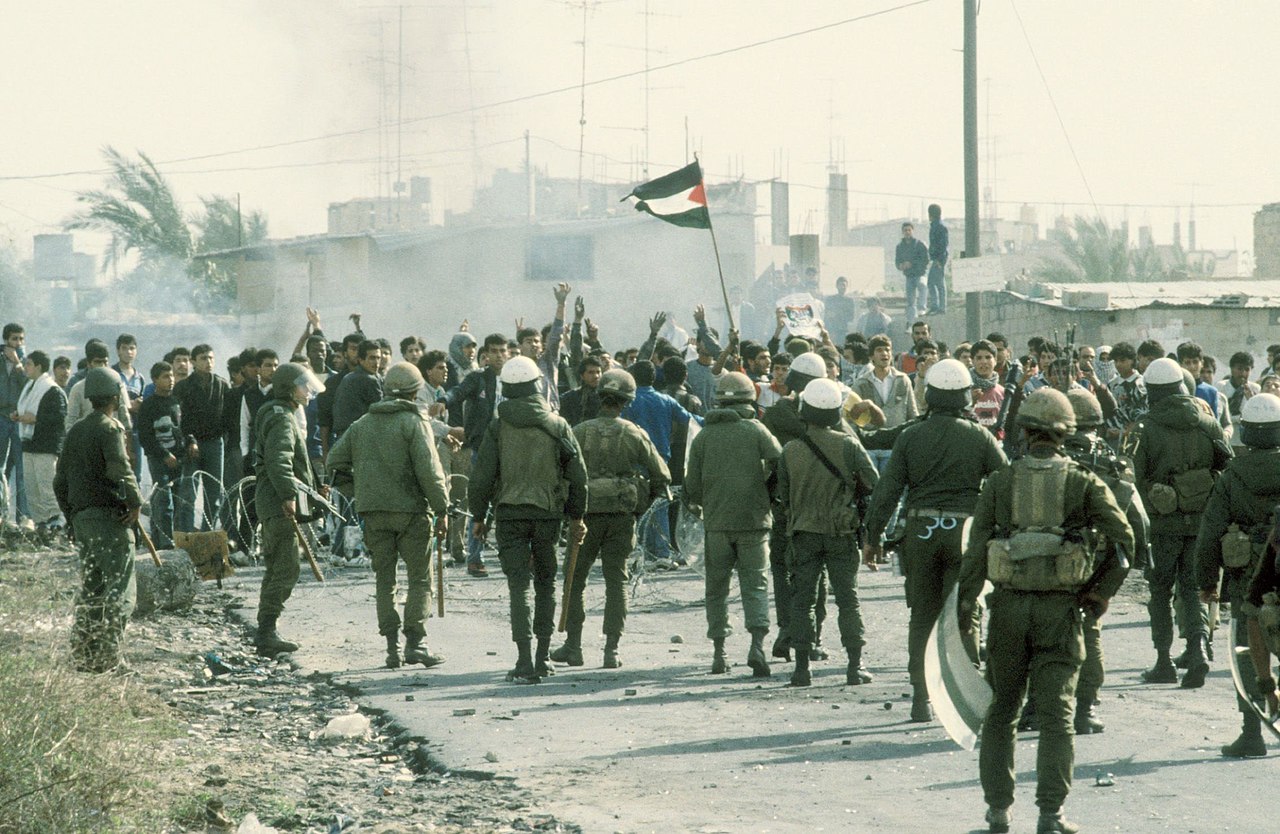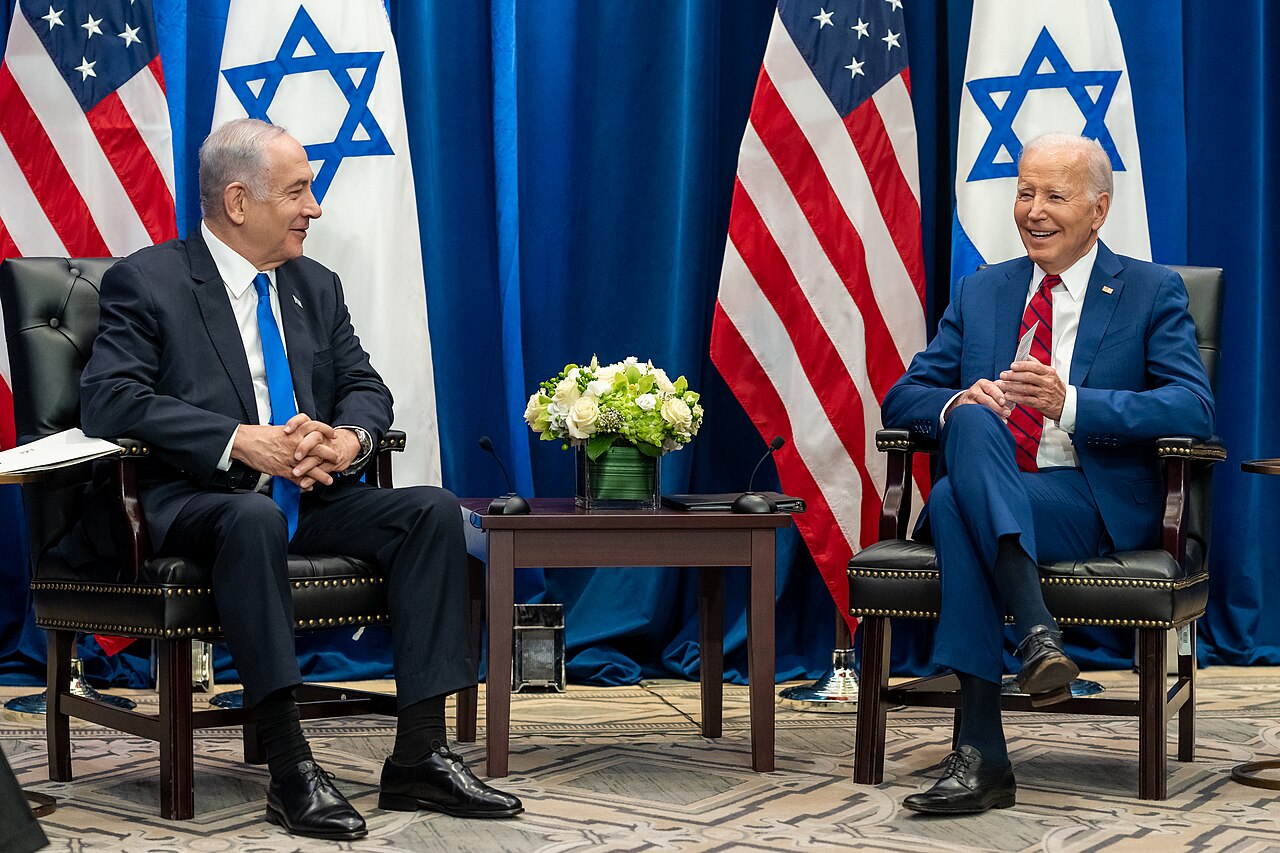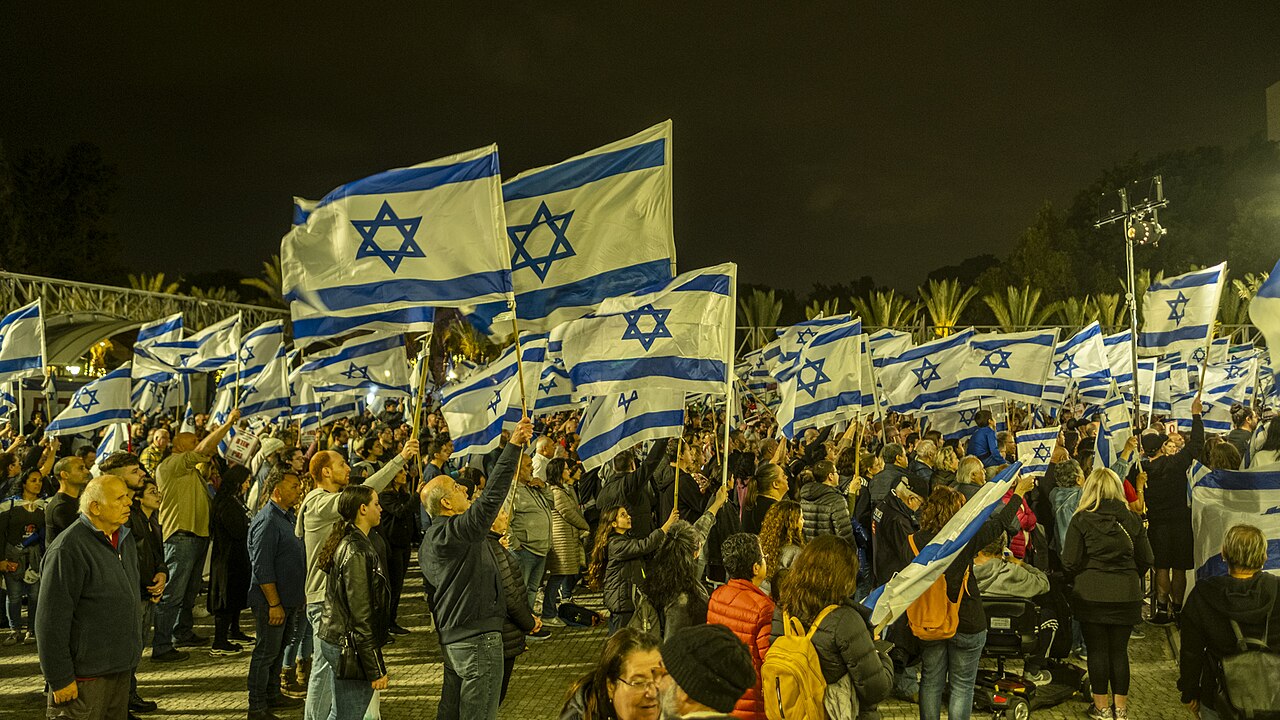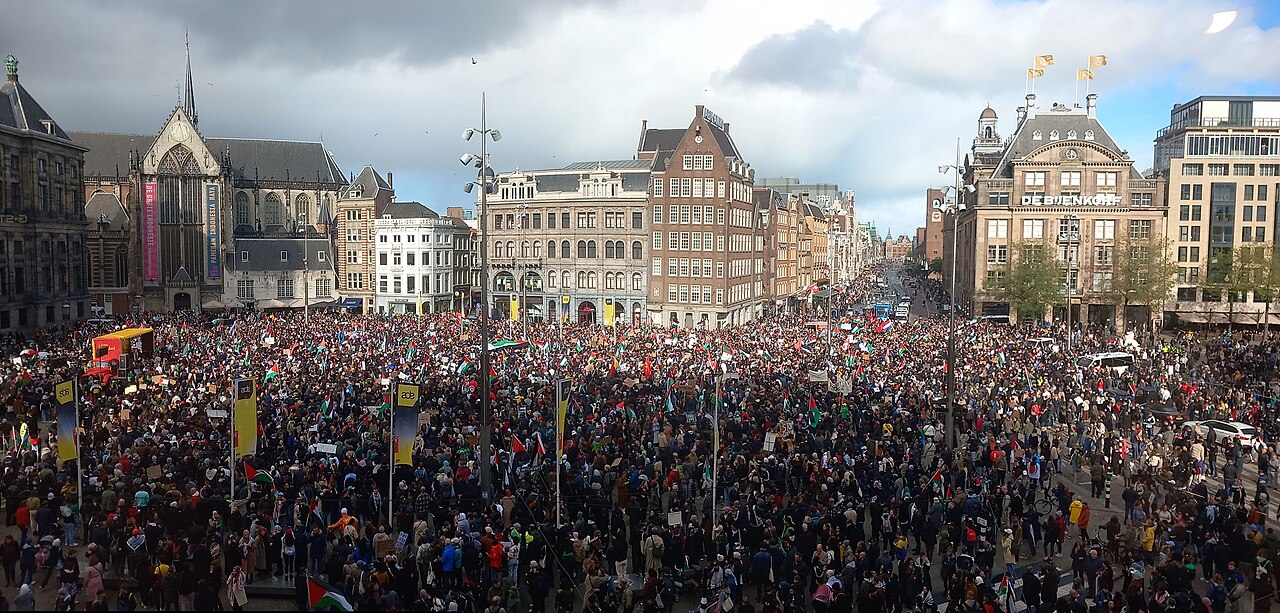The Israeli-Palestinian conflict is one of modern history’s most protracted and contentious disputes. Over the years, various proposals and peace initiatives have been put forth to settle the conflict, with the two-state solution being the most widely recognized framework. Complicated Israeli-Palestine relations are exceptionally interesting for IR scholars, especially those who adopt the conventional paradigm of security studies. However, alternative approaches occurred in recent years that could shed fresh light on the reasons that compel those two entities to perpetual and unsolvable conflict. This study claims that the ontological security puzzle of Israel provoked the conflict between its multiple identities that, even before the event of October 7, undermined the possibility of a two-state solution application and, after the attacks, banished the possibility of amicable cohabitation of Palestine and Israel on the same territory for years to come.
Theoretical Framework
Sociologist Anthony Giddens fetched ontological security into social sciences from Jacques Lacan and his work. In his terms, ontological security is „a sense of confidence and trust that the world is what it appears to be“. [1, 746] Accordingly, the actor must create relationships based on mutual „basic trust“ and elimination of otherness to address common issues. [2] The fundamental question that ontological security in IR studies was developed to answer is why some states did not want to end the conflict, as the other schools of security studies envisioned, but instead wanted it to be frozen and protracted. [3] What authors offered as an answer is the so-called security-of-being, counterweighting it to the orthodox wisdom of security as surviving existential dangers. According to this reasoning, freezing the conflict minimizes the uncertainty and unpredictability around the state. Thus, it established routinized relationships. Routinization denotes the depreciation of uncertainty and unpredictability of social order. [4] It creates a so-called „anxiety reduction mechanism“. [1] Such routinized and predictable relations make the unambiguous assignment of roles possible. Rumelili argues that ontological security can be established even during war because war can minimize uncertainty and contribute to the general sense of ontological security. [3]

In broader terms, as Browning and Joenniemi pointed out [5], ontological security is rather a question of adaptability to changes, uncertainties, and anxiety. The latest is the crucial concept in ontological security studies (OSS). It is a broader sense of insecurity not attached to a particular object. Hence, anxiety is an enduring feature of international order, like anarchy. States and non-state actors can merely minimize the sense of anxiety to a bearable level but never eradicate it as long as it is not set to a distinct object, with the elimination of which security can be re-established. Anxiety results in a wide range of reactions, unlike fear, which is fixed with two responses – fight or flight. [6] Those reactions may deviate from anticipation and paralysis [6] to identity shift and avoidance. [7]
Identity is another noteworthy concept for OSS. This term is utilized with the connection to the Self. Thus, the Self is the form that can be stipulated to different dynamically changing identities. [6] According to Sucharov, states may contain different identities. [8] Those identities are built differently. Mitzen illustrated how routinized relations between states feed into their identity needs, that is, their ontological security [9], while Steele, on the contrary, argues that the Self is more a product of an internal, self-help behaviour than of dialectic relationship with others. [10] According to Bechleitner, a country’s identity and Self is shaped by its historical experiences, which are brought into the present through storytelling or what interdisciplinary literature often refers to as ‚collective memory‘. The concept of collective memory suggests that history – the actual events of the past – only becomes significant for a country’s identity through its interpretation in the present. [4] Although ontological security is not primarily about identity, they are essential in mitigating uncertainty.
Historical Context
The establishment of the State of Israel in 1948 triggered a series of wars and conflicts, leading to a situation where Israel now controls the majority of historical Palestine. The Palestinian people, who were displaced or remained in areas now under Israeli control, have long sought self-determination and statehood. The first time Palestinians became vocal about their aspirations was by establishing the first organization to advocate those ideas – the Palestinian Liberation Organization in 1964. The world may have observed their mass violent resilience to the Israeli occupation with the outbreak of the First Intifada in 1987. It failed to achieve its primary goal of ending the occupation and creating an independent Palestinian state. Although it forced Israel to negotiate with the Palestine Authority, the peace process that emerged from the Intifada was flawed and incomplete. The Intifada thus ended with a fragile and temporary truce rather than a lasting and comprehensive peace. [11]
The Oslo Accords, signed in 1993, established a limited Palestinian self-rule in parts of the occupied territories. However, it failed spectacularly to achieve its goals and was marred by violence, mistrust, and violations on both sides. Israel continued to expand its settlements and restrict Palestinian movement in the occupied territories while Palestinians carried out attacks against Israeli civilians and security forces. The failure of Camp David was followed by the outbreak of the Second Intifada, a violent uprising that lasted until 2005 and claimed thousands of lives on both sides. The Second Intifada marked the end of the Oslo Peace Process and the hopes for a peaceful resolution of the conflict. [12]
The definite end to the popular perception of the withdrawal was put in 2005 by the infamous Gaza Strip withdrawal. It was a well-intended but poorly executed step by Israel that backfired on its own security and stability. Scholars agree that the reasons for this failure are various: from the absent coordination with PA, lack of monopoly on power within the Palestinian community, [13] Israeli tight blockade on Gaza, exacerbation of social and economic conditions within the Gaza strip. [14] The withdrawal did not address the root causes of the conflict, such as the occupation, the settlements, the refugees, and the status of Jerusalem. Instead, it created a new reality that worsened the situation for both Israelis and Palestinians.
The events of October 7, 2023, provoked another wave of discussions about Palestine and its relations with Israel, contributing to the overall polarization of popular opinion on the issue, raising the level of antisemitism in Europe, and becoming a subject of many new disinformation campaigns. Some observers compare those events with the 9/11 terrorist attack, referring to the former as „Israeli 9/11“. [15] The overall casualties of the Hamas attack, launched that day, are estimated to be around 1200 people [16], with 240 captured as hostages. [17]
The Ontological Puzzle of Israel
According to Sucharov, Israel possesses three identities: Israel as a democratic state, Israel as a security provider, and Israel as a Jewish state. [8] She also suggested the triple dilemma, in which Israel could maintain only two of three identities simultaneously without causing ontological dissonance. [7] At the moment, Israel is experiencing a conflict of multiple identities that was provoked by the set of events that started back in the 1990s with the First Intifada and Oslo Accords. This article utilises this concept to formulate the central ontological security puzzle for Israel, which involves determining the feasibility of accommodating all three identities within a self and exploring the methods by which this can be achieved.
Democracy for Israel is indeed essential. It helps distinguish the State of Israel – the Western civilised nation – from the Arab surroundings. Such a form of orientalization of the neighbours can be explained by the ontological security paradigm. The identity of the Self is, according to Mitzen, developed from the interaction with „significant others“ in drawing the parallel lines between them and distinguishing the Self from the others. In the case of Israel, the „significant others“ are the West, to whom they want to belong, and the Muslim Arab world, from whom they want to separate. At some point, being Israeli became being non-Arab. [18] Interactions with the West, particularly the US, are radically shaping the identities of Israel, at least due to Israel’s economic dependency on the US, according to Krampf. He states that this dependence on the Western capital – either from the US, Germany, or diaspora – „was a key pillar in Ben-Hurion’s doctrine“ that was, until recently, shaping Israel’s foreign policy. [19]

Democratic tradition in Israel has some distinctive features. One of them is the ethno-democratic nature. Ethnic democracy, according to Smooha, is a democratic political system that perceives the non-members of the ethnic majority as inferior and sometimes even as a menace. [26] Israel’s case is illustrative as long as the state has been discriminating against Arabs and Muslims since the proclamation of independence in 1948. Such a specific feature of Israeli democracy provoked the First Intifada in 1987. Alongside the ethnic democracy, some scholars identify Israel as a defensive democracy, meaning a political system designed to deter and outlaw highly menacing groups. [20] What is exceptionally interesting is that the nation that should represent most of the population is this endangered group. Thus, Israel is the one who is feeling existential anxiety, if not existential threat.
This protective nature of the state and the omnipresent existential threat correlate with the second face of Israel – a state security provider. It tries to address three main issues in the security sphere: political and physical survival of the state of Israel, protection against the Palestinian minority within Israel and preservation of the Jewish diaspora abroad. [21] The importance of the Jewish diaspora is also a part of the economic policies until Netanyahu’s premiership. The diaspora supplied the Jewish settlers and then the State of Israel since the 1880s. [19] Therefore, Israel is repaying its debt in the form of protection and repatriation of the representatives of global Jewry.
All those identities stick to the one crucial premise: Israel is a Jewish nation-state, according to the constitution of Israel. It derives from the very idea of Zionism. Despite the existence of parliamentary representation of the Arabs, Israel is still the state of Jews, and as was highlighted above, their democracy works on this bedrock. Here, Israel meets a dilemma: whether to accept multiculturalism and integrate the Palestinians and Arabs in general into their society, risking losing their Jewish majority (so-called demographic threat) or adopting the apartheid policy that would undermine its democratic identity. The root causes of the Israeli to prefer the second option may be found in the lessons the Jewish population learnt from the time of mass antisemitism and especially the Holocaust. [22]
State that Provides Security
The security-provider identity is the most important for understanding the recent developments in Israel. The political discourse about the physical survival of the state is spinning around two main strategies: first is maintaining the occupied territories to achieve strategic depth; second is the following of the UNSC Resolution 242 and the land-for-peace formula that was successfully implemented in the case with the Sinai withdrawal. The leadership of Israel has been shifted vigorously between those two poles for the last two decades. For instance, Ariel Sharon’s premiership was characterized by a more „dovish“ approach: his government was accountable for the infamous Gaza withdrawal. In his own words, occupation is corrupting the democracy of Israel. [23] The alike logic can be traced in the rhetoric of PM Rabin and PM Olmert, too. Unlike them, the current PM Benjamin Netanyahu represents the opposite – „hawkish“ – pole. In the binary of Israel as a democratic state and security provider, he chooses the latter over the former. His activities are more or less oriented on the erosion of Israel’s democracy, covering those activities with the label of „securing the Jewish identity“. [24]

The security for Netanyahu and the Likud party lies in the maintenance of the occupied territories. The key to understanding the conflict of identities and ontological insecurity is hidden in operationalizing the security provider identity. This identity is the closest to existential security, but unlike security-as-survival, it means that the state and army provide it, in other words, the self-helping mechanism. [7] Back in 1968, when Israel occupied the territories of the Golan Heights, the Gaza Strip and the West Bank, the only possible way for Israel to mitigate the existential threat was occupation. By occupying territories, Israel obtained so-called „strategic depth“ that allowed it to distance the potential military actions from the core part of the state. However, the events of the Arab Spring, Second Intifada, Gaza Strip and Southern Lebanon withdrawals showed some different things. First, the political elite in Israel found themselves fatigued after the withdrawal [25] which separated the Kadima party from the Likud party. The change in warfare deflates the value of the occupation, but withdrawal would lead to even more severe consequences. Thus, the easiest solution is to preserve the status quo. Second, Palestine lacks the unified centre of power that would be able to negotiate a deal with Israel. Hamas, as a more popular political and military movement unifying Palestinians, systematically prefers violent and terrorist methods of achieving statehood for Palestine. [26] All of this resulted in the natural will to mitigate the uncertainty and produce the routinized behaviour toward the occupied territories. This behaviour is presented in settlement expansion and the „production of territories“ in the West Bank. [27]
The October 7 attack on Israel reinforced this theory, as long as it pointed out the exposed nerve of this identity: the government, for whom providing security is vital, failed at it miserably, which resulted in the most considerable losses of the Jewish population since the Holocaust. It gets even more severe if we consider that the big clashes were predicted by analysts [28] and intelligence [29] way before the attack. The October 7 attack is a personal trauma and disgrace for Netanyahu: ignoring the intelligence reports and many concerned voices played a lousy card with his political career and perception of him and his party as „security providers“. It can explain his attempts to reject accountability for the attack in recent press conferences [30] and blaming the intelligence for the failure on October 7. [31] This failure will have ramifications for years to come, if not decades, considering the unprecedented level of antisemitism in Europe and accusations of Palestinian genocide against the backdrop of the military operation in the Gaza Strip. Those might include the exacerbated position of Israel in the West and the breakdown of normalization with the neighbouring Arab world.

The question of how can Israel restore or adjust its identity as a security provider remains open. The successful withdrawal of Sinai suggests that diplomacy and the „land-for-peace“ formula can be effective. However, one might highlight some essential nuances. First, Egypt, unlike Palestine, is a unified and working state with one centre of power capable of negotiations. Second, the whole process of Sinai withdrawal took more than two decades to result in the Camp David agreements. Third, American mediation played a vital role in this process. At the time, there were no such drastic fluctuations in US foreign policy as during the Trump administration. However, current situation within the US is frightening. The turbulence within the Congress regarding financial aid for Israel and Ukraine exacerbates the situation with American support. The radical wings of both Democrats and GOP were blocking the support for Israel as long as it was connected to the financial support for Ukraine, even though there was a bipartisan consensus in both Houses. [more about it on 32]
Moreover, the two-state solution is closely tied to rapprochement with Arab states, primarily Saudi Arabia. The events of October 7 happened most likely due to Iran’s strategic interests to destroy the Zionist movement and the State of Israel itself. It spoilt any normalization with Arab states and postponed it for probably a long time. In addition, this attack undermined Israeli self-perception as a state security provider. If taking into account all those nuances with the unfavourable historical experience, the state of Israel is improbable to accept a possible two-state solution soon, mainly because of triggered existential anxiety and national trauma. They were not addressing the issues of ontological security, resulting in the preservation of occupation and violence in the region. Therefore, the logic is that attempting to deescalate the situation may actually result in more violence, which could pose a threat to Israel both existentially and ontologically.The recent events showed that Israel does not see any other options to enforce peace except occupation, isolation of Gaza, more considerable security and economic pressure on the local population, and expansion of the Jewish settlements in Jerusalem. [33] The October 7 attack became a point where the matters of ontological security crystallized into physical security issues that will be solved accordingly.
Conclusion
The current position of the Netanyahu government results from the ontological insecurity provoked by the uncertainty near the borders. Therefore, by attempting to preserve the status quo, the government wants to routinize the relations with Palestine. One might rebut this claim by suggesting who would be willing to routinize the violent conflict. As Mitzen puts it, „States might come to prefer their ongoing, certain conflict to the unsettling condition of deep uncertainty as to the other’s and one’s own identity“. [9, 342] The peaceful and diplomatic efforts to establish certainty according to the formula „land for peace“, as in the case of Egypt, failed, and the understandable reaction of the population and government was to preserve the conflict with the specific enemy rather than establish a fragile peace that any violent militant organizations like Hamas or the Palestinian Islamic Jihad may violate. On top of that, this conflict presents an excellent opportunity to preserve and feed the identity of Israel as a Jewish state and the security seeker through neglecting the democratic identity, as is done by the Netanyahu government.
At the time, Israel was affected by the internal identity conflict that influenced domestic and foreign policy. The mass protests against the government’s efforts to eliminate the judicial branch’s independence showed the cleavage between the government’s vision and the people’s will. They both tend to accept their state as a Jewish state that provides security. However, while Netanyahu is ready to neglect the democratic traditions of the country, people expressed their attitude toward this decision. In this critical moment of national division, the Hamas terrorist attack of October 7 changed the perception of the reality for both the government of Israel and the population. It can be inferred that Netanyahu’s political future will be significantly jeopardized following the war’s end. From the ontological point of view, Netanyahu sacrificed the democratic identity in order to elevate the image of the security provider that is now being not only challenged by Hamas but also virtually destroyed in the eyes of his electors and the population in general. What happened is that the Netanyahu government promised to reinforce the state’s security but failed at it. In addition, his government challenged the democratic identity that Israelis are proud of, which provoked the protests. The events of October 7 became a turning point when the issues of ontological security, by far supercooled, were disturbed by the external attack and rapidly transformed into the matter of physical security with an unprecedented number of people killed and taken hostages. [16]
As for the future of the two-state solution, we can only speculate about the post-war order. The most probable thing to happen is that Israel, under substantial internal and external pressure, will leave Gaza after clearing the region of Hamas leaders. This will not solve the identity dilemma because Hamas can reincarnate and still present a threat to the Israeli population. What is the optimal scenario is that Palestine will stop demanding the whole territory of Israel to be „liberated“. In contrast, Israel would stop treating them as a threat and promote economic cooperation between the two states. However, this scenario is unlikely to happen due to the seemingly perpetual perception of Palestine as a threat by Israel. As long as the government in Tel Aviv does not find the balance between its three identities, there will not be any two-state solution.
Article reviewed by: Michaela Mildorfová, Dávid Dinič
Sources
[1] Kinnvall, C. (2004). Globalization and Religious nationalism: self, identity, and the search for Ontological security. Political Psychology, 25(5), 741–767. https://doi.org/10.1111/j.1467-9221.2004.00396.x.
[2] Giddens, A. (2013). Modernity and Self-Identity: Self and Society in the Late Modern Age. John Wiley & Sons.
[3] Rumelili, B. (2014). Conflict Resolution and Ontological Security. https://doi.org/10.4324/9781315796314.
[4] Bachleitner, K. (2021). Ontological security as temporal security? The role of ‘significant historical others’ in world politics. International Relations, 37(1), 25–47. https://doi.org/10.1177/00471178211045624.
[5] Browning, C. H., & Joenniemi, P. (2016). Ontological security, self-articulation and the securitization of identity. Cooperation and Conflict, 52(1), 31–47. https://doi.org/10.1177/0010836716653161.
[6] Kinnvall, C., & Mitzen, J. (2020). Anxiety, fear, and ontological security in world politics: thinking with and beyond Giddens. International Theory, 12(2), 240–256. https://doi.org/10.1017/s175297192000010x.
[7] Lupovici, A. (2012). Ontological dissonance, clashing identities, and Israel’s unilateral steps towards the Palestinians. Review of International Studies, 38(4), 809–833. https://doi.org/10.1017/s0260210511000222.
[8] Sucharov, M. M. (2006). The International Self: Psychoanalysis and the Search for Israeli-Palestinian Peace. SUNY Press.
[9] Mitzen, J. (2006). Ontological Security in World Politics: State Identity and the Security Dilemma. European Journal of International Relations, 12(3), 341–370. https://doi.org/10.1177/1354066106067346.
[10] Steele, B. J. (2018). Ontological Security in International Relations: Self-identity and the IR State. Routledge.
[11] Roberts, A. (1990). Prolonged Military Occupation: The Israeli-Occupied Territories Since 1967. American Journal of International Law, 84(1), 44-103. doi:10.2307/2203016.
[12] Shamir, S., & Maddy-Weitzman, B. (2005). The Camp David Summit–what Went Wrong?: Americans, Israelis, and Palestinians Analyze the Failure of the Boldest Attempt Ever to Resolve the Palestinian-Israeli Conflict.
[13] Pinfold, R. G. (2021). Territorial withdrawal as multilateral bargaining: Revisiting Israel’s ‘unilateral’ withdrawals from Gaza and southern Lebanon. Journal of Strategic Studies, 44(3), 418–449. https://doi.org/10.1080/01402390.2019.1570146.
[14] Shlaim, A. (2009). Israel and Palestine: Reappraisals, Revisions, Refutations.
[15] Wall Street Journal. (2023). “This is Israel’s 9/11”, Says Israeli Ambassador to the United Nations [Video]. WSJ. https://www.wsj.com/video/this-is-israel-911-says-israeli-ambassador-to-the-united-nations/EEB7D0D5-81CF-480D-A3E3-7B2FE666EE29
[16] Reuters. (2023, November 10). Israel revises Hamas attack death toll to “around 1,200.” Reuters. https://www.reuters.com/world/middle-east/israel-revises-death-toll-oct-7-hamas-attack-around-1200-2023-11-10/
[17] Al Jazeera. (2023, November 10). Israel revises down toll from October 7 attack to ‘around 1,200.’ Al Jazeera. https://www.aljazeera.com/news/2023/11/10/israel-revises-death-toll-from-october-7-hamas-attack-to-1200-people
[18] Khazzoom, A. (2003). The Great Chain of Orientalism: Jewish identity, stigma management, and ethnic exclusion in Israel. American Sociological Review, 68(4), 481. https://doi.org/10.2307/1519736
[19] Krampf, A. (2022, December 7). The Netanyahu Doctrine. The Jerusalem Strategic Tribune. https://jstribune.com/krampf-the-netanyahu-doctrine/
[20] Barak, A. (2000). Freedom of expression and its limitations, In Cohen-Almagor, R. (ed.), Challenges to Democracy. Essays in Honour and Memory of Isaiah Berlin. Aldershot: Ashgate, 176-88.
[21] Smooha, S. (2002). The model of ethnic democracy: Israel as a Jewish and democratic state. Nations and Nationalism, 8(4), 475–503. https://doi.org/10.1111/1469-8219.00062.
[22] Wilson, E. K., & Bleiker, R. (2013). Memory and trauma in international relations. https://doi.org/10.4324/9781315882659
[23] Tessler, M. (2009). A History of the Israeli-Palestinian Conflict, Second Edition. Indiana University Press.
[24] Keller-Lynn, C., & Bachner, M. (2022). Judicial reform, boosting Jewish identity: The new coalition’s policy guidelines. Times of Israel. https://www.timesofisrael.com/judicial-reform-boosting-jewish-identity-the-new-coalitions-policy-guidelines/
[25] Greene, T. (2015). Israel’s two states debate. International Affairs (Royal Institute of International Affairs 1944-), 91(5), 1009–1026. http://www.jstor.org/stable/24539016.
[26] Hamas group explained: Here’s what to know about the group behind the deadly attack in Israel. (2023, October 10). NBC News. https://www.nbcnews.com/news/investigations/hamas-know-group-deadliest-attack-israel-decades-rcna119628
[27] Handel, A., Allegra, M., & Maggor, E. (2022). The Israeli Settlements. In Routledge eBooks (pp. 218–233). https://doi.org/10.4324/9780429027376-18.
[28] Nagel, J. (2023, January 12). Security Challenges Facing the New Israeli Government. The Jerusalem Strategic Tribune. https://jstribune.com/nagel-security-challenges-facing-the-new-israeli-government/
[29] Israel missed “obvious” signs ahead of Oct. 7 Hamas attack, top intel lawmaker says. (2023, November 14). POLITICO. https://www.politico.com/news/2023/11/14/rep-mike-turner-hamas-attacks-were-a-huge-intelligence-failure-00127165
[30] Schneider, T. (2023, October 30). Netanyahu is trying to avoid an accounting for October 7. This time, he won’t escape. The Times of Israel. https://www.timesofisrael.com/netanyahu-is-trying-to-avoid-an-accounting-for-october-7-this-time-he-wont-escape/
[31] The Times of Israel Staff and Agencies. (2023, October 30). Netanyahu slammed for post blaming intelligence chiefs for Oct. 7 failure; apologizes. The Times of Israel. https://www.timesofisrael.com/netanyahu-sharply-criticized-for-post-blaming-intelligence-chiefs-for-oct-7-failure/
[32] Cortellessa, E., & Bennett, B. (2023, October 11). Biden and Congress craft $2 billion aid package as Israel vows to ‘Crush’ Hamas. TIME. https://time.com/6322820/israel-aid-biden-congress-hamas/
[33] Cordesman, A. H. (2023, November 1). The War in Gaza and the Death of the Two-State Solution. Center for Strategic and International Studies. https://www.csis.org/analysis/war-gaza-and-death-two-state-solution





